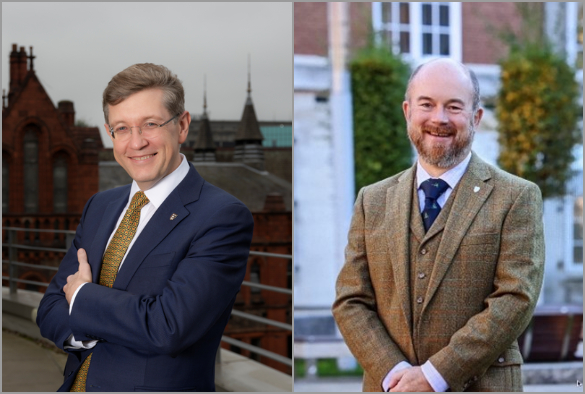Professor Iain Buchan and Professor Calum Semple OBE have been recognised by the Faculty of Public Health (FPH) for their contributions to public health research and practice. Their well-deserved honours were announced at an awards ceremony which took place at the Royal College of Physicians in London on Tuesday, 7 June 2022.
Professor Iain Buchan (pictured above receiving the award) was the recipient of the Faculty’s prestigious Alwyn Smith Prize for 2022. This prize was created by Professor Alwyn Smith on his retirement as FPH President in 1986 to celebrate the outstanding contribution of members to the health of the public by either research or practice in public health. Last year’s winner of this award was Sir Peter Horby, and a previous Liverpool recipient was Dame Margaret Whitehead.
Professor Buchan was recognised for his outstanding leadership and dedication to service-based scholarship, including delivery of world-leading evidence on the effectiveness of SARS-COV-2 rapid antigen asymptomatic testing (underpinning policies in the UK and internationally), leading the first data-driven, risk-mitigated reopening of a cluster of mass events in the Northern Hemisphere after lockdowns, and designing an award winning data/intelligence infrastructure, which supported these COVID-19 responses and is now being used in NHS recovery and multiple health innovation projects.
On receiving his award Professor Buchan said: “I am deeply honoured to receive this prize from my professional family of Public Health. It was a privilege to work with so many dedicated public health professionals in genuine partnership with academia through the COVID-19 pandemic – especially via the University of Liverpool’s Institute of Population Health. It felt like one team across universities, local and national public health teams, with great camaraderie – the most intense and fulfilling experience of my career to date.
“Working between public health, informatics and data science disciplines over the past 20 years, it has been my pleasure to bring alive for engineers and physical scientists what ‘organising the efforts of society’ means in public health terms – helping these disciplines swarm together and deliver great responses to COVID-19 from Liverpool has been extremely rewarding.”
Professor Calum Semple (pictured above receiving the award) has been elected by the Faculty of Public Health to Fellowship through Distinction of the Faculty. This level of membership is only offered to those who are recognised as having distinguished themselves through their significant contribution to the science, literature or practice of public health. The UK Faculty of Public Health is the professional standards and membership body for public health specialists and practitioners, and has around 4000 members across the UK and overseas. As a Fellow, Professor Semple will help support the Faculty’s mission to improve and protect the health of the public and influence public health policy.
On his appointment, Professor Semple said: “I am thrilled and honoured to be elected to the Faculty of Public Health by Distinction. I am delighted to take this opportunity to recognise the equal contribution made by my friends and colleagues in the International Severe Acute Respiratory and emerging Infection Consortium (ISARIC), and the two and a half thousand research nurses and medical students in the UK who did the heavy lifting by collecting clinical data in time to make a difference. It is only by preparing now that we can protect ourselves from future pandemic threats”
Professor Louise Kenny CBE, Executive Pro-Vice Chancellor for the Faculty of Health and Life Sciences said “The University of Liverpool is exceptionally proud of Calum and Iain. They have both, individually and as part of our wider University team, been at the forefront of our COVID response and their work continues to inform policy nationally and internationally. They exemplify the power and impact of a civic university and are true role models for the importance of research in addressing the grand challenges that society now faces. It is wonderful to see their contribution recognised in this way.”
